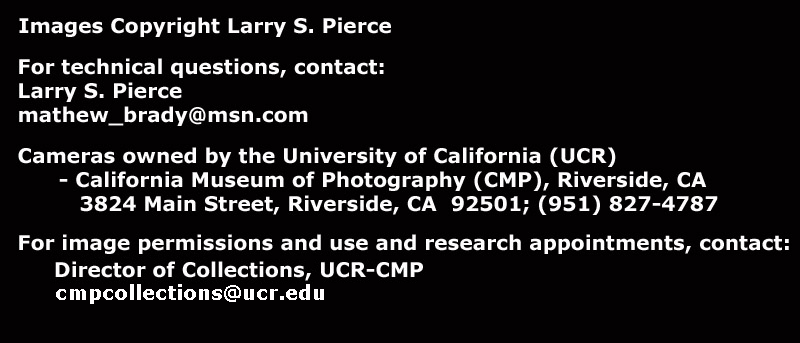Conley Camera Co., Rochester, MN
No. 2
Conley View Camera
Model B
Conley
View Camera
New York View Camera
Queen City View Camera No. 40
Cameras
& Photographic Supplies,
Sears, Roebuck & Co.,
Catalog
159T.2.10.10.14.10,
1914,
p. 1162
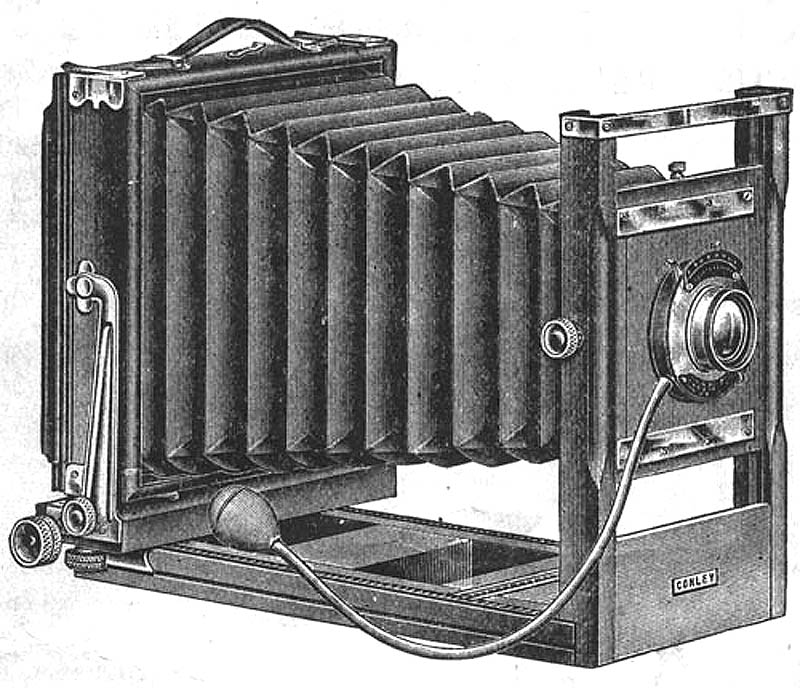
5 x 7
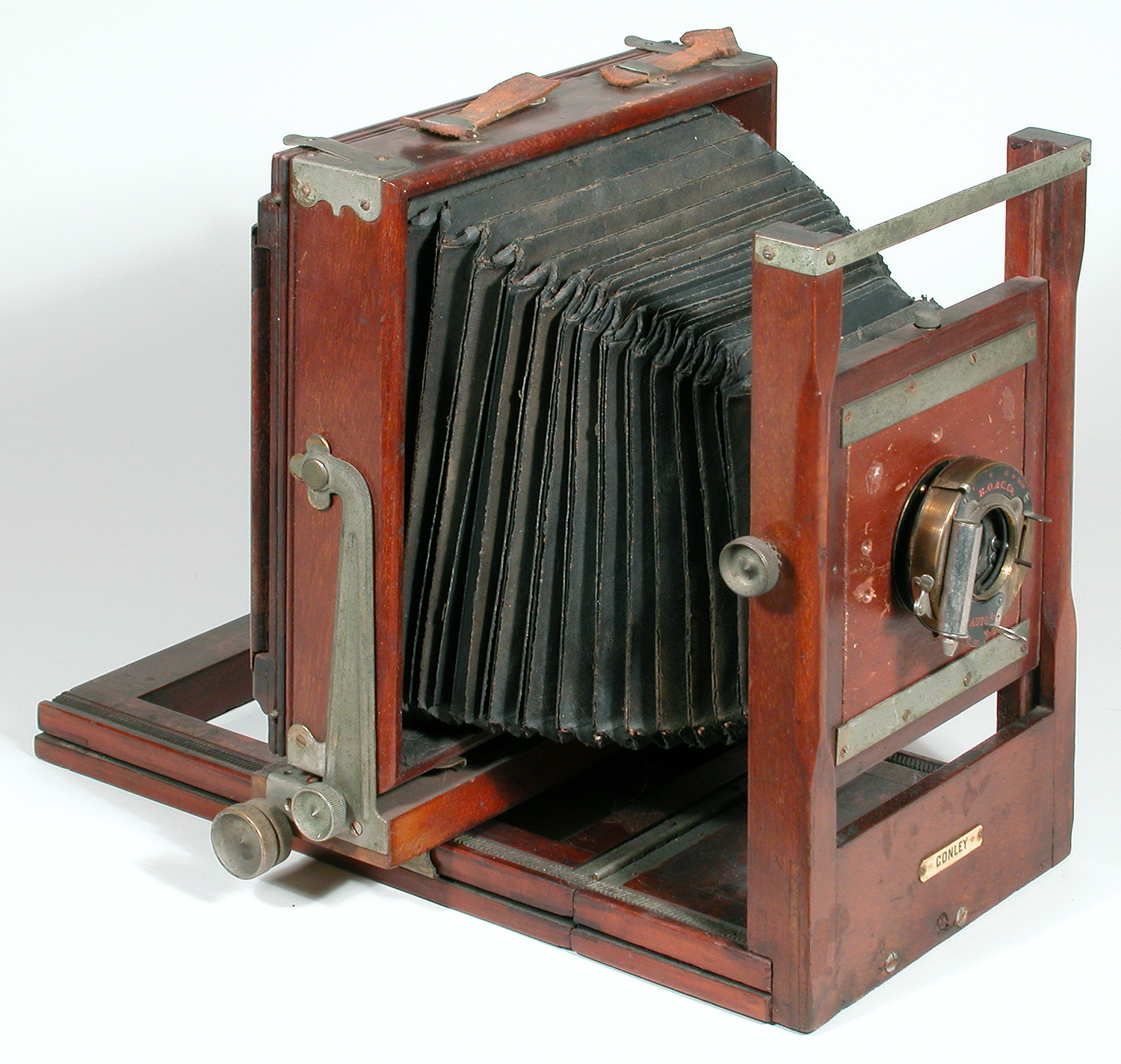
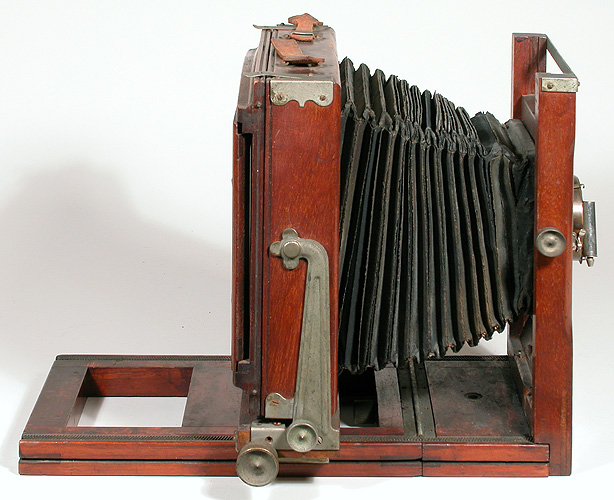
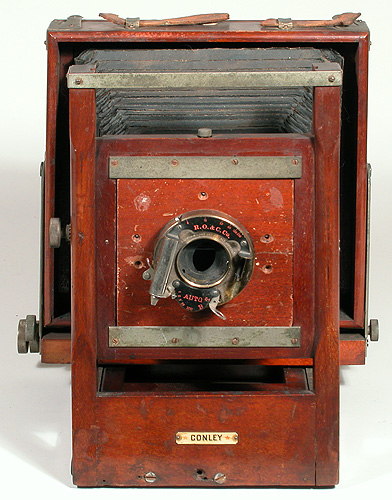
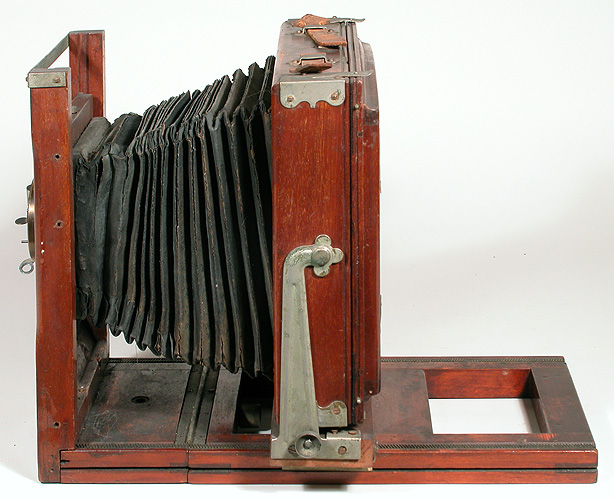
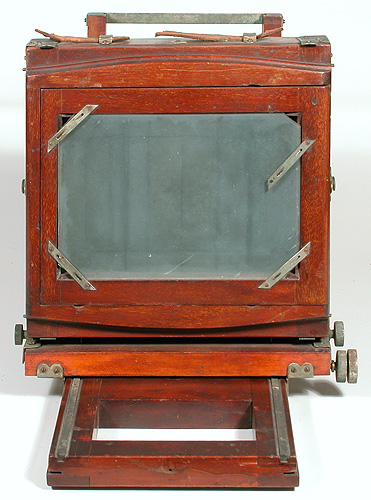
Date Introduced: - ;
Years Manufactured: c. 1904
- 1917
Construction: back focus
via rack and pinion (two gear tracks on top of base rails),
single swing, reversing by removable back, three piece lens board,
geared rising front - thumbscrew on right side
Materials: mahogany wood body; cherry base;
black fabric bellows; nickel-plated hardware
Sizes Offered: 5x7, 6 ½x8 ½, 8x10
Notes:
The Conley Camera Co. was active c.1900-c.1920s, and made cameras under its own label as well as made cameras for the Sears, Roebuck & Co. under a Sears label. Note that it was located in the Rochester, Minnesota, not Rochester, New York. Prior to about 1909, Sears, Roebuck & Co. contracted with various manufacturers, including the Rochester Optical group of companies and the Century Camera Co. The Sears cameras of this era, whatever the manufacturer, bore the brand name Seroco (ever so cutely derived from the first letters of Sears, Roebuck & Co.). In 1907, both the Rochester Optical & Camera Co. and Century Camera Co. were purchased by Eastman Kodak Co. This may have had something to do with Sears eventually contracting with the Conley Camera Co. about 1908, an association that resulted in Sears' purchase of Conley in 1924.
The Conley Camera Co. cameras consist of three basic models (Model 1, Model 2 and Seroco-labeled). The Model 1 and Seroco-labels cameras each have two observed variations:
Model No. 1 Conley View Camera (also advertised as the
Model BS Conley View Camera, the
Queen City View Camera No. 38 View Camera,
and the Seroco View Camera Variation 2):
The Model No. 1 and
Model No. 2 Conley cameras are
the most commonly encountered Conley products, and are readily
recognized due to their cloverleaf-shaped terminus of the swing
hardware on the sides of the rear standard. The cloverleaf is
unique to the Model No. 1 Variation 1
and Model No. 2 Conley view
cameras. The Model No. 1
has rack and pinion focus capability for both the front and rear
standards. It also has a detachable rear extension and an extended
bellows to match its long reach.
Model No. 1 Conley View Camera Variation 1:is
the earliest version of the Model No. 1.
Variation 1 has slanted or
obliquely angled gears for its rack and pinion focusing - a construction
unique among all manufactured view cameras. That it provides a
smooth, dependable and durable focusing is true - all examples of
slanted rack and pinion focusing that I have handled function
marvelously well, although tending toward a tight fit. This is the
only model and variation of Conley view cameras seen to have this
feature, as even the contemporaneously advertised
No. 2 Conley View Camera has so
far only been seen to have gears perpendicular to the long dimension of
the platform (although it would make sense that there should be a
Variation 1 and
Variation 2 in both the
Model No. 1 and
Model No. 2, assuming that they
were made at the same time in the same factory using similar
manufacturing fixtures and jigs ).
Model No. 1 Conley View Camera Variation 2
was manufactured with gears perpendicular to the long dimension, a
re-tooling that suggests that there was some problem with the slanted
gears - probably a production problem, since they always seem to perform
well). Other differences between
Variation 1 and Variation 2
of the Model No. 1 include:
1) the knob and mechanism for the front standard rise is interior to the
front standard in Variation 1,
whereas it is behind the front standard in
Variation 2, 2) The
Variation 2 comes with a sliding
part of the platform enabling the camera to be balanced when placed on a
tripod, 3) the lens board is retained in
Variation 2 by a fixed strip of metal at the top and a
rotating clip at the bottom, whereas the
Variation 1 has two fixed strips of metal, relying on a
spring installed behind the top strip of metal and a precisely sized
lens board to retain it, 4) the four strips that retain the ground glass
at the camera back have a sharp shape in
Variation 2, whereas they are rounded in
Variation 1, and 5) the wood
finish of the Variation 1 is
natural, whereas it is stained dark in
Variation 2 (This is similar to the change at Eastman Kodak
Co. from the natural finish
EKC View Camera No. 2 to the dark
stained EKC View
Camera No. 2d, which may indicate an industry-wide trend
towards darker finish).
Model No. 2 Conley View Camera (also advertised as the Model B Conley View Camera, the Queen City View Camera No. 40, and the New York View Camera). The Model No. 2 is a rear focus only, the front being fixed to the platform. It also shares the slanted or oblique gears relative to the long dimension of the platform, the interior mechanism of the front rise, the two long strips that retain the lens board, and the natural finish of the No. 1 Conley View Camera Variation 1. It has no provision for extension of the platform, nor would its bellows extend past its normal platform length.
Seroco
View Variation 1 is identical to the
Century
Camera Co. Century View Camera Variation 2.0. It can be
found advertised in the Sears general catalog of 1909 - this despite the
fact that the last time Century had advertised it was in their 1903
catalog. Sears was primarily a re-seller of goods, so must have
contracted with Century to produce the camera on which they put their
label. Similarly, Sears must have contracted with Conley in order
for us to see Conley camera models with Seroco labels. It would make sense that the Conley-manufactured
view cameras that Sears sold in the 1910's after first selling the Century-manufactured
Seroco View Variation 1 in
1909. Yet,
the Seroco
View Variation 2
(identical to the
Model No. 1 Conley View
Camera Variation 1 except that it has a surround for its rise thumbscrew) is
found advertised in the
1908 Sears camera-specialty flyer. This apparently means that
Sears sold a Conley view cameras in 1908, a Century view cameras in 1909
and went back to Conley view cameras for 1910 and following, or both
style view cameras in 1909. A further complication to
understanding what went on between Sears, the Century Camera Co. and the
Conley Camera Co. is despite the apparent Century-made camera appearing
in the reprinted 1908 Sears general catalog, only Conley products appear
in the Sears photographic-only specialty catalogs of
c.1908,
c.1909 and
c.1910.
Seroco View Variation 2 is one of the aliases for the
No. 1 Conley View Camera Variation 1,
discussed above.
New Model Conley View Camera (also advertised as the Conley Model BW View Camera) is basically the same camera as the Model No. 1 Conley View Camera, except that 1) the distinctive cloverleaf-shaped swing hardware in the Model No. 1 has been replaced with a plain piece of hardware in the New Model, and 2) the gravity-based arrow on the right side of the rear standard used to indicate whether the camera is level in the Model No. 1 has been replaced with a bubble-type level in the New Model. The new model is found both with light (natural or clear) wood finish as well as dark wood finish.
References:
Cameras, Silent Shutters and Photographic Accessories, Catalog No. 5,
Conley Camera Co. (Rochester, MN), c. 1904, pp. 26-27 (As Queen City
View Camera, No. 40)
Cameras & Photographic Supplies,
Sears, Roebuck & Co. (Chicago, IL) Catalog 159L 3rd
Edition, c. 1908, p.
263 (as No. 2 Conley View Camera, cedar)
Cameras & Photographic Supplies,
Sears, Roebuck & Co. (Chicago, IL) Catalog 159R 1st
Edition, 1909, p. 38-39 (as Model B Conley
View Camera, cedar)
Cameras & Photographic Supplies,
Sears, Roebuck & Co. (Chicago, IL) Catalog 159T 2nd
Edition, 1910, p. 38-39 (as Model B Conley
View Camera, cedar)
T. M. McAlister Catalog, c. 1910
(As New York View)
Cameras & Photographic Supplies,
Sears, Roebuck & Co. (Chicago, IL) Catalog
159h.2.2.29.12.15, 1912,
p. 39 (As Model B Conley View Camera)
Cameras & Photographic Supplies,
Sears, Roebuck & Co. (Chicago, IL) Catalog
159T.2.10.10.14.10, 1914,
p. 1162 (As Model B mahogany camera body instead of cedar)
Catalogue No. 14,
J. L. Lewis (New York, NY) Catalog, 1913, p. 7
(As New York View)
Cameras and Photographic Supplies, Sears, Roebuck & Co.
(Chicago, IL), Catalog 410E,
1916, p. 20 (As Model B mahogany camera body instead
of cedar)
Cameras and Photographic Supplies, Sears, Roebuck & Co.
(Chicago, IL), Catalog 410F,
c.1917, p. 20 (As Model B
mahogany camera body instead of cedar)
Back to Miscellaneous Camera Companies
